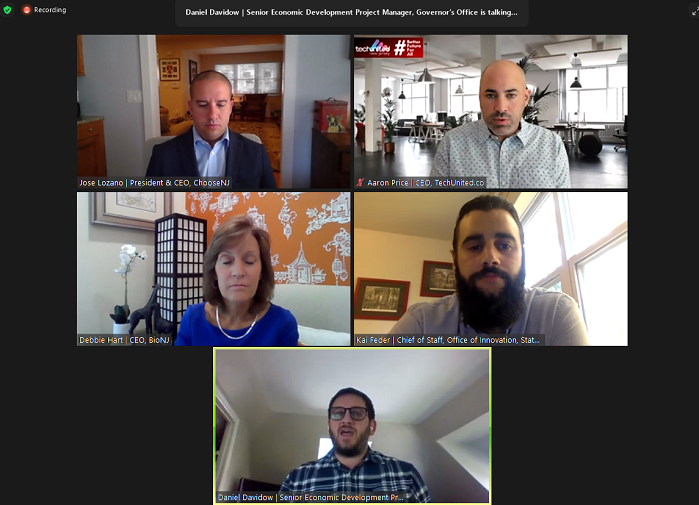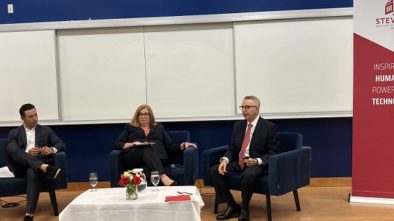Panel Sees Opportunity for New Jersey to Capitalize on COVID-induced Workplace Trends
At a discussion titled “Keeping the Innovation State Growing,” on October 14, all the panelists agreed on one point: Work at tech and life science companies will look dramatically different in the years to come.
This trend presents opportunities for New Jersey and its real estate sector, and the State should be ready to capitalize on them.
The panel discussion took place at a conference called “Opportunities for NJ’s Innovation Economy during COVID-19,” sponsored by the New Jersey Economic Development Authority (NJEDA) and cochaired by Judith Sheft, executive director of the NJEDA’s Commission on Science, Innovation and Technology, and by Serpil Guran, director of the Rutgers EcoComplex.
Moderated by Kai Feder, chief of staff at the Office of Innovation, State of New Jersey, the panel included Debbie Hart, president and CEO of BioNJ (Trenton); Daniel Davidow, senior economic development project manager at the Office of New Jersey Governor Phil Murphy; Jose Lozano, president and CEO of Choose New Jersey (Newark); and Aaron Price, president and CEO of TechUnited:NJ (New Brunswick).
“One thing that’s interesting that the pandemic has really changed, I think, is our perception of space, and whether commercial space is a place to do business right now,” said Feder. He asked the panel to comment.
Lozano said that companies with large footprints are currently reassessing their need for space. And if they need space, “the open-floor plan in the middle of a pandemic isn’t the most ideal.” Companies located in high-concentration vertical spaces in high-rise buildings are asking, “‘Are there opportunities for me to sublease and take a smaller space closer to my employees?’ because we all know, at some point or another, teams have to come back together.”
Is Remote Work Sustainable?
Lozano said that he was not convinced that organizations will be able to sustain remote work over time “because you’re losing the opportunity for employees and team members working together and figuring out what are the strategies to solve problems for the future. … We’re human, at the end of the day, and we need that human-to-human interaction.”
He noted that the buildings that have embraced the “live, work, play” scenario will be perfectly situated for a return to the workplace.
Hart said that she missed her team, and couldn’t wait to get them back together in the same place. For the life science and biotech industries, real estate will remain essential. “Lab space is one thing, manufacturing space is one thing that will be needed. There will certainly be innovations, and perhaps some things will become more compact over time. But, at the end of the day, that is going to have to happen in real estate,” she said.
Hart added that she was excited about the conversations she’d been having about reshoring — bringing manufacturing back to the United States — to avoid supply chain interruptions. She noted that 80 percent of all active pharmaceutical ingredients are made in China.
Hybrid Workplaces
Speaking about the tech industry, Price said that big tech companies like Dropbox and Airbnb are buying out their leases for tens of millions of dollars and setting up virtual workspaces. “I do believe there’ll be a hybrid [work arrangement] in the future, and I think there’s a New Jersey opportunity here. We have a lot of vacant space. We can spread out the space in some capacity. And I think there’s an opportunity for us to retain people who may have been going into New York.”
He added that the solution will be different for each company, and that he believes that companies that adapt to a hybrid model will have a better chance of recruiting and retaining good people. “Some 25 percent of Google’s New York employees live in New Jersey,” and we have an opportunity to keep those people in New Jersey, he added.
Leaving Behind those Park Avenue Addresses
Panelists thought that the address didn’t matter anymore, so companies won’t be seeking a Park Avenue address. They will be more willing to set up businesses in New Jersey, as long as they have access to the New York and Newark airports. Panelists also thought that it was important that New York City bounce back, so New Jersey can thrive in its orbit.
Price added that he had often spoken about Hoboken’s potential to be a tech hub because of its proximity to New York, among other features. “I’m not so sure that that matters so much anymore. I think now it’s about, as we mentioned, the balance of work.”
Davidow noted that whatever is happening in the marketplace is really going to dictate what happens on the ground in New Jersey, and that right now people are determining how they want to use space.
“We have challenges to the current market, obviously, when we have very high-density vertical spaces,” he said. “How that impacts the market long term is going to be an issue that we have to deal with over the next couple of years.”
At the same time, we have “some suburban office parks that have kind of gone by the wayside, and a lot of towns don’t exactly know what to do with them.” He added that there may be an opportunity for more spread-out space based on New work arrangements.




